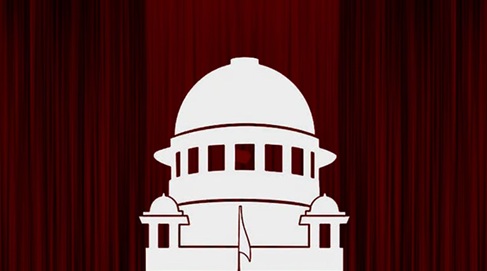(Prelims: Current Affairs)
(Mains, General Studies Paper-2: Structure, Organisation and Functions of Executive and Judiciary; Powers, Functions and Responsibilities of Various Constitutional Bodies) |
Context
- Ahead of the upcoming assembly elections in Bihar, the Election Commission (ECI) published the draft voter list on August 1, 2025 under 'Special Intensive Revision (SIR)'. In this draft, the names of about 65 lakh voters were removed, which were earlier included in the voter list prepared in January 2025.
- The Supreme Court in an interim order on August 14, 2025 directed the ECI to make public the names of the removed voters and the reason, which the ECI has published.

About Special Intensive Revision (SIR)
- Special Intensive Revision (SIR) is a special process by the Election Commission to update and purify the voter list.
- It is a more intensive process than the general revision and aims to remove errors in the voter list, such as dead, migrated or double registered voters.
- SIR in Bihar was ordered to start on June 24, 2025, to prepare an accurate voter list for the assembly elections.
Objectives
- Accuracy of voter list: To make the list accurate by removing dead, migrant or double registered voters
- Ensuring fairness: To ensure fair elections through clean and reliable voter list
- Instilling confidence: To instill confidence in voters that their presence in the voter list is protected.
- Legal compliance: To fulfill constitutional and statutory obligations that provide every adult the right to vote.
Process
- Door-to-door verification: Booth Level Officers (BLOs) go door-to-door to check voters' details.
- Deletion: Names of voters who are dead (22 lakh), permanently transferred (36 lakh) or have double registration (7 lakh) have been deleted in Bihar.
- Publication of draft list: A revised draft voter list is published, on which objections can be filed.
- Resolution of objections: Affected voters can file their objections and they are reviewed by the ECI.
- Final list: The final voter list is published after resolution of objections.
Recent Supreme Court order
On August 14, 2025, the Supreme Court issued an interim order, directing the following:
- Ordered the ECI to publish a booth-wise list of 65 lakh deleted voters, with the reason (death, migration, untraceability or double registration) for each deleted name clearly stated.
- Displaying this list on the websites of District Election Officers (DEOs) and on the notice boards of Booth Level Officers (BLOs), Block Development/Panchayat offices.
- Making the list searchable based on EPIC (Electors Photo Identity Card) number.
- Wide publicity through local and English newspapers, radio, TV and authorized social media.
- Allowing affected voters to file objections with Aadhaar card, which will be accepted as proof of identity and residence.
- Directing ECI to submit compliance report in the next hearing.
Significance of the order
- Transparency: Voters have the right to know why their names were deleted, which can reduce misinformation and doubts.
- Democratic rights: The order ensures the constitutional right to be included in the voter list, especially for migrant workers who were inadvertently deleted.
- Use of Aadhaar: For the first time, Aadhaar was formally accepted as a proof of identity and residence in the SIR process.
- Precedent for future: This order will set a precedent for SIR processes in other states.
Criticism
- Lack of transparency: The ECI initially refused to make public the names and reasons of voters removed, which was seen as non-transparent.
- Large-scale removals: The removal of 65 lakh voters (about 10% of the voter base) threatened to disenfranchise marginalised communities.
- Political allegations: Some opposition parties (such as the Rashtriya Janata Dal (RJD) and the Congress) alleged that certain caste and socio-economic groups were targeted.
- Verification errors: The Association for Democratic Reforms (ADR) claimed that there were flaws in field verification and outdated data was used.
Challenges
- Lack of awareness: Rural and illiterate voters may find it difficult to access the list and file objections.
- Lack of resources: There is a lack of adequate staff and technical resources at the district and booth levels.
- Lack of time: The list published within the court-imposed deadline (August 18) is prone to errors.
- Political pressure: There are pressures on the ECI to be impartial due to intense political rivalry in Bihar.
Way forward
- Awareness campaign: Educate voters about their rights and the process of filing objections
- Technological advancement: Make EPIC-based search more user-friendly and increase digital access
- Local support: Train BLOs and DEOs so that they can assist affected voters.
- Monitoring and accountability: The ECI should submit regular compliance reports and arrange for independent audits.
- Inclusive policies: Ensure that every voter is informed about the correctness of the list to prevent marginalised communities from being targeted.
Conclusion
The Supreme Court order is an important step towards enhancing the credibility and transparency of the voter list in Bihar. The ECI should use this opportunity to strengthen voters' confidence and make the democratic process more inclusive.



